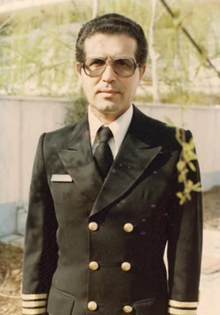Bahram Afzali
Bahram Afzali (Persian: بهرام افضلی; 1937–1984) was the Commander of the Islamic Republic of Iran Navy from May/June 1980 to 24 April 1983.[2] He was executed for his clandestine membership in the Tudeh Party of Iran in 1984.[2]
Bahram Afzali | |
|---|---|
 Afzali in summer 1980 | |
| Birth name | Bahram Afzali Khoshkebijari[1] |
| Born | 6 December 1937 Qom, Iran |
| Died | 25 February 1984 (aged 46) Tehran, Iran |
| Service/ | Navy |
| Years of service | 1957–1984 |
| Rank | Captain |
| Commands held | Islamic Republic of Iran Navy |
| Battles/wars |
|
| Alma mater | Italian Naval Academy University of Genoa |
Career
Afzali was born in 1937[3] in the city of Qom.[2] His father was a cleric.[1] He entered the service of the Imperial Iranian Navy in 1957 and was sent to Italy for further education.[3] In 1961, he was graduated from Italian Naval Academy,[2] where he was trained in mechanical engineering and shipbuilding.[3] He later obtained a PhD in boat and submarine architecture in 1970.[2]
Afzali was an engineer and a captain in the Imperial Iranian Navy.[4] After the 1979 revolution, he continued to serve in the Navy and took part in the Iran–Iraq War.[4] Then Iranian president Abolhassan Bani Sadr appointed him as the commander of the Navy in June 1980.[5] He was also special adviser of then speaker of the Iranian parliament, Ali Akbar Hashemi Rafsanjani.[6]
Arrest, trial and death
At the beginning of 1983, Afzali, along with more than a thousand members of the Tudeh Party was arrested by the IRP.[7] The trial carried out in the form of a military tribunal in December 1983, and 32 of them were sentenced to death.[8] Their judge was Hojjat Al Islam Mohammad Reyshahri, who also interrogated Mahdi Hashemi in 1986.[9] The location of the tribunal has been never revealed.[9]
Ten of these Tudeh members were executed.[8] On 25 February 1984, Afzali was executed on charges of espionage for the Soviet Union.[4][8][10]
References
- Nikola B. Schahgaldian, Gina Barkhordarian (March 1987), The Iranian Military Under the Islamic Republic (PDF), RAND, p. 113, ISBN 0-8330-0777-7, retrieved 15 January 2017
- Boroujerdi, Mehrzad; Rahimkhani, Kourosh (2018). Postrevolutionary Iran: A Political Handbook. Syracuse University Press. p. 63. ISBN 9780815654322.
- Iran Almanac and Book of Facts, 18, Echo of Iran, 1987, p. 304
- "Mr. Bahram Afzali". OMID. Retrieved 13 February 2013.
- "30 persons dead, 80 injured in Iranian-Iraqi frontier clash". The Calgary Herald. 2 June 1980. Retrieved 13 February 2013.
- Shireen T. Hunter; Jeffrey L. Thomas; Alexander Melikishvili (2004). Islam in Russia: The Politics of Identity and Security. M.E. Sharpe. p. 506. ISBN 978-0-7656-1282-3. Retrieved 13 February 2013.
- George W. Breslauer (1990). Soviet Strategy in the Middle East. Unwin Hyman. p. 131. ISBN 978-0-04-445232-4. Retrieved 13 February 2013.
- Sepehr Zabir (23 April 2012). The Iranian Military in Revolution and War (RLE Iran D). CRC Press. p. 115. ISBN 978-1-136-81270-5. Retrieved 13 February 2013.
- Ervand Abrahamian (1999). Tortured Confessions: Prisons and Public Recantations in Modern Iran. University of California Press. p. 199. ISBN 978-0-520-21623-5. Retrieved 13 February 2013.
- Hunter, Shireen T. (Spring 1987). "After the Ayatollah". Foreign Policy. 66 (66): 77–97. doi:10.2307/1148665. JSTOR 1148665.
External links
| Military offices | ||
|---|---|---|
| Preceded by A. Tabatabaei |
Commander of the Islamic Republic of Iran Navy 1980–1983 |
Succeeded by Esfandiar Hosseini |